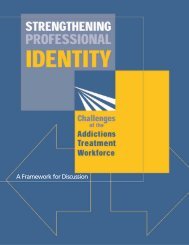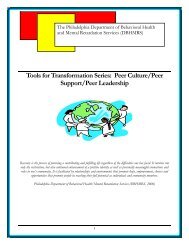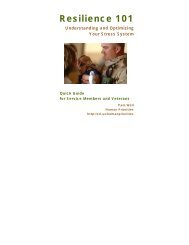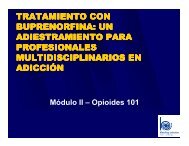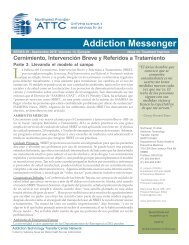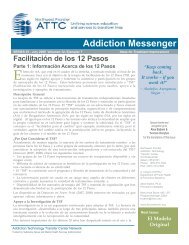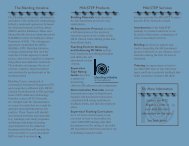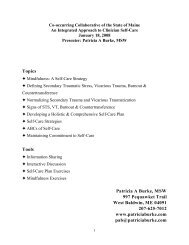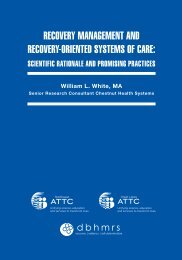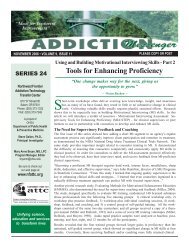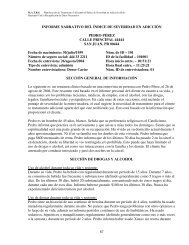alcohol and other drug problems among addiction professionals
alcohol and other drug problems among addiction professionals
alcohol and other drug problems among addiction professionals
You also want an ePaper? Increase the reach of your titles
YUMPU automatically turns print PDFs into web optimized ePapers that Google loves.
◆Guidelines for Interviewing <strong>and</strong> Hiring: The goal of this projectwill be to present to each hiring manager specific guidelines, includinginterviewing st<strong>and</strong>ards, the evaluation of expectations, uniform h<strong>and</strong>lingof performance issues, <strong>and</strong> ways of balancing all these elements. To thisend, the participant will gather existing data on legal issues, interviewingpractices, job descriptions, employee h<strong>and</strong>books, workplace policies, <strong>and</strong>counseling approaches.5. Privacy: We need to define ways of balancing personal privacy with professionalduties, responsibilities, <strong>and</strong> obligations.◆◆Policies <strong>and</strong> Procedures for Disclosure: This document will includepolicies <strong>and</strong> procedures on disclosure of elements such as recoverystatus <strong>and</strong> AOD use, guidelines for exceptions, <strong>and</strong> consequences for nondisclosure.In preparation, this participant will identify areas of personalbehavior that may have adverse impact on an employee’s performance,the reputation of the service provider or the profession within the community,<strong>and</strong> any negative or conflicting messages that their behavior mightsend to the client or the community. Procedures will address appropriateresponses to employee behavior, keeping in mind the best interests of theclient, the organization, the community, <strong>and</strong> the profession.Resource Tool <strong>and</strong> In-Service for Increasing Balance <strong>and</strong>Effectiveness: This resource tool will be designed to increase the effectivenessof <strong>addiction</strong> <strong>professionals</strong>, helping them balance their personalprivacy with their professional duties, responsibilities, <strong>and</strong> obligations. Itwill identify these professional duties, responsibilities, <strong>and</strong> obligations inaccordance with TAP 21 (The Addiction Competencies established by theSubstance Abuse <strong>and</strong> Mental Health Services Administration, Center forSubstance Abuse Treatment). This participant will use the dictates of law<strong>and</strong> a fair labor survey of <strong>professionals</strong> in the field to define personal privacy<strong>and</strong> delineate its appropriate boundaries. Based on this information,the participant will compile a document <strong>and</strong>/or a training, including anin-service education outline, to serve as an educational resource for supervisors<strong>and</strong> supervisees in the <strong>addiction</strong> field.6. Non-Discriminatory Policies <strong>and</strong> Practices: Organizations should developnon-discriminatory policies <strong>and</strong> procedures that prevent <strong>and</strong> manage <strong>problems</strong>that might be experienced by <strong>addiction</strong> <strong>professionals</strong>. These include: (1) aconsistent code of ethics <strong>and</strong> (2) consistent hiring practices.◆Non-Discriminatory Policies <strong>and</strong> Procedures: This project willbegin with an assessment of current policies <strong>and</strong> practices in the field, includingan analysis of their deficiencies <strong>and</strong> the ways in which they mightdiscriminate against recovering staff. Naturally, this process will have to in-n 50 n



